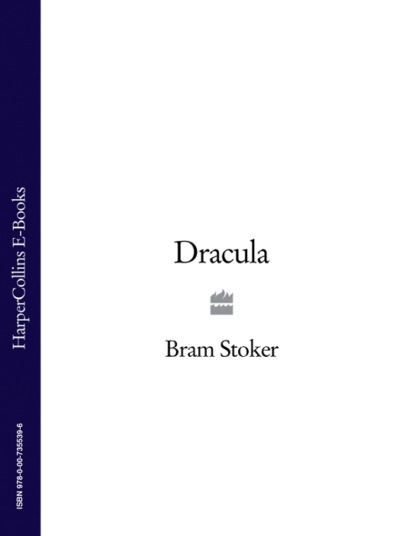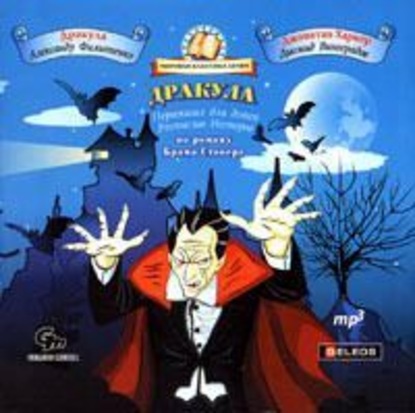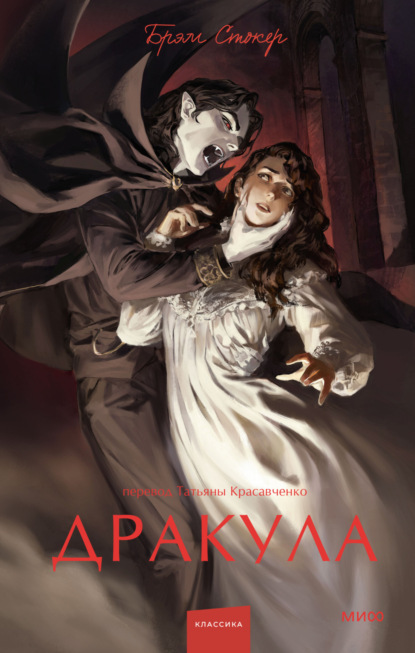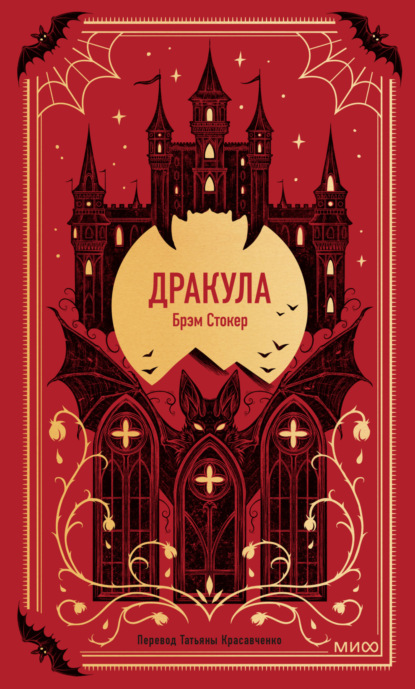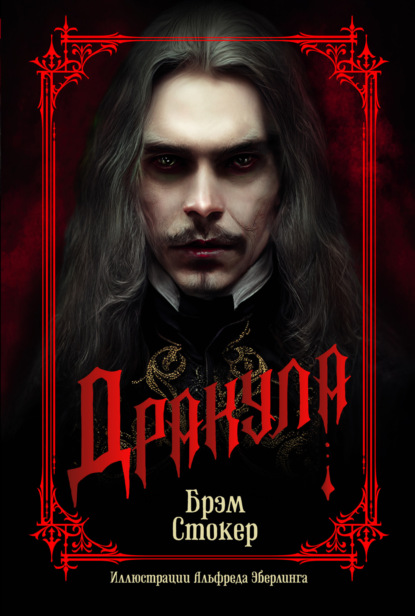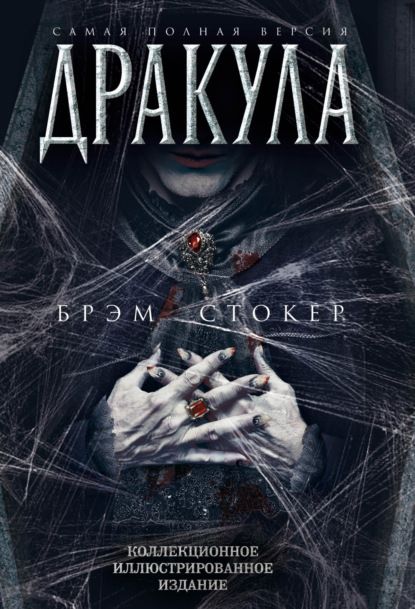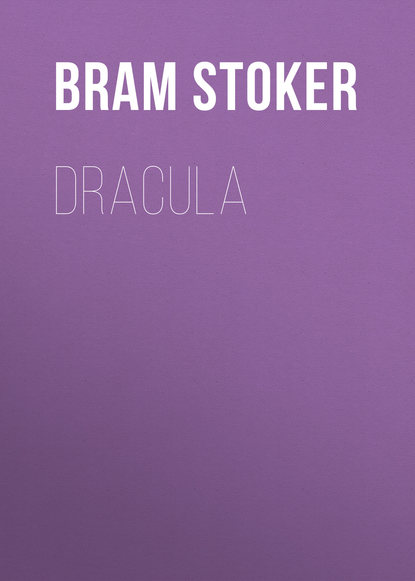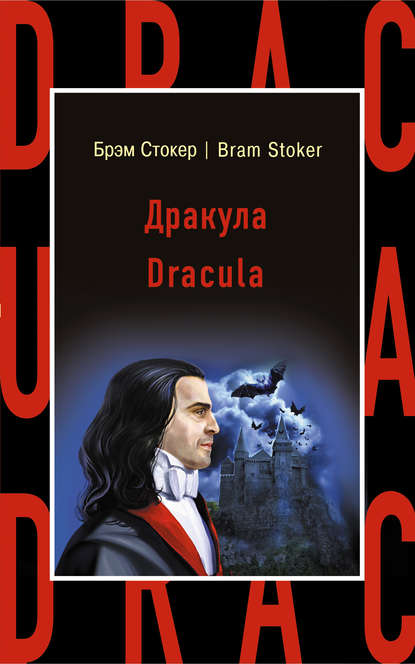
Полная версия
Дракула / Dracula
It so happened that there was no one at the moment on Tate Hill Pier, as all those whose houses are in close proximity were either in bed or were out on the heights above. Thus the coastguard on duty on the eastern side of the harbour, who at once ran down to the little pier, was the first to climb aboard. The men working the searchlight, after scouring the entrance of the harbour without seeing anything, then turned the light on the derelict and kept it there. The coastguard ran aft, and when he came beside the wheel, bent over to examine it, and recoiled at once as though under some sudden emotion. This seemed to pique general curiosity, and quite a number of people began to run.
It is a good way round from the West Cliff by the Drawbridge to Tate Hill Pier, but your correspondent is a fairly good runner, and came well ahead of the crowd. When I arrived, however, I found already assembled on the pier a crowd, whom the coastguard and police refused to allow to come on board. By the courtesy of the chief boatman, I was, as your correspondent, permitted to climb on deck, and was one of a small group who saw the dead seaman whilst actually lashed to the wheel.
It was no wonder that the coastguard was surprised, or even awed, for not often can such a sight have been seen. The man was simply fastened by his hands, tied one over the other, to a spoke of the wheel. Between the inner hand and the wood was a crucifix, the set of beads on which it was fastened being around both wrists and wheel, and all kept fast by the binding cords. The poor fellow may have been seated at one time, but the flapping and buffeting of the sails had worked through the rudder of the wheel and had dragged him to and fro, so that the cords with which he was tied had cut the flesh to the bone.
Accurate note was made of the state of things, and a doctor, Surgeon J. M. Caffyn, of 33, East Elliot Place, who came immediately after me, declared, after making examination, that the man must have been dead for quite two days.
In his pocket was a bottle, carefully corked, empty save for a little roll of paper, which proved to be the addendum to the log.
The coastguard said the man must have tied up his own hands, fastening the knots with his teeth. The fact that a coastguard was the first on board may save some complications later on, in the Admiralty Court, for coastguards cannot claim the salvage which is the right of the first civilian entering on a derelict. Already, however, the legal tongues are wagging, and one young law student is loudly asserting that the rights of the owner are already completely sacrificed, his property being held in contravention of the statues of mortmain, since the tiller, as emblemship, if not proof, of delegated possession, is held in a dead hand.
It is needless to say that the dead steersman has been reverently removed from the place where he held his honourable watch and ward till death, a steadfastness as noble as that of the young Casabianca,[52] and placed in the mortuary to await inquest.
Already the sudden storm is passing, and its fierceness is abating. Crowds are scattering backward, and the sky is beginning to redden over the Yorkshire wolds.[53]
I shall send, in time for your next issue, further details of the derelict ship which found her way so miraculously into harbour in the storm.
9 AugustThe sequel to the strange arrival of the derelict in the storm last night is almost more startling than the thing itself. It turns out that the schooner is Russian from Varna, and is called the Demeter. She is almost entirely in ballast of silver sand, with only a small amount of cargo, a number of great wooden boxes filled with mould.
This cargo was consigned to a Whitby solicitor, Mr. S. F. Billington, of 7, The Crescent, who this morning went aboard and took formal possession of the goods consigned to him.
The Russian consul, too, acting for the charter-party, took formal possession of the ship, and paid all harbour dues, etc.
Nothing is talked about here today except the strange coincidence. The officials of the Board of Trade have been most exacting in seeing that every compliance has been made with existing regulations. As the matter is to be a ‘nine days wonder’, they are evidently determined that there shall be no cause of other complaint.
A good deal of interest was abroad concerning the dog which landed when the ship struck, and more than a few of the members of the S. P.C.A., which is very strong in Whitby, have tried to befriend the animal. To the general disappointment, however, it was not to be found. It seems to have disappeared entirely from the town. It may be that it was frightened and made its way on to the moors, where it is still hiding in terror.
There are some who look with dread on such a possibility, lest later on it should in itself become a danger, for it is evidently a fierce brute. Early this morning a large dog, a half-bred mastiff belonging to a coal merchant close to Tate Hill Pier, was found dead in the roadway opposite its master’s yard. It had been fighting, and manifestly had had a savage opponent, for its throat was torn away, and its belly was slit open as if with a savage claw.
LaterBy the kindness of the Board of Trade inspector, I have been permitted to look over the log book of the Demeter, which was in order up to within three days, but contained nothing of special interest except as to facts of missing men. The greatest interest, however, is with regard to the paper found in the bottle, which was today produced at the inquest. And a more strange narrative than the two between them unfold it has not been my lot to come across.
As there is no motive for concealment, I am permitted to use them, and accordingly send you a transcript, simply omitting technical details of seamanship and supercargo. It almost seems as though the captain had been seized with some kind of mania before he had got well into blue water, and that this had developed persistently throughout the voyage. Of course my statement must be taken cum grano,[54] since I am writing from the dictation of a clerk of the Russian consul, who kindly translated for me, time being short.
Log Of The ‘Demeter’, Varna to Whitby
Written 18 July, things so strange happening, that I shall keep accurate note henceforth till we land.
On 6 July we finished taking in cargo, silver sand and boxes of earth. At noon set sail. East wind, fresh. Crew, five hands… two mates, cook, and myself, (captain).
On 11 July at dawn entered Bosphorus. Boarded by Turkish Customs officers. Backsheesh. All correct. Under way at 4 p. m.
On 12 July through Dardanelles. More Customs officers and flagboat of guarding squadron. Backsheesh again. Work of officers thorough, but quick. Want us off soon. At dark passed into Archipelago.
On 13 July passed Cape Matapan. Crew dissatisfied about something. Seemed scared, but would not speak out.
On 14 July was somewhat anxious about crew. Men all steady fellows, who sailed with me before. Mate could not make out what was wrong. They only told him there was SOMETHING, and crossed themselves. Mate lost temper with one of them that day and struck him. Expected fierce quarrel, but all was quiet.
On 16 July mate reported in the morning that one of the crew, Petrofsky, was missing. Could not account for it. Took larboard watch eight bells last night, was relieved by Amramoff, but did not go to bunk. Men more downcast than ever. All said they expected something of the kind, but would not say more than there was SOMETHING aboard. Mate getting very impatient with them. Feared some trouble ahead.
On 17 July, yesterday, one of the men, Olgaren, came to my cabin, and in an awestruck way confided to me that he thought there was a strange man aboard the ship. He said that in his watch he had been sheltering behind the deckhouse, as there was a rain storm, when he saw a tall, thin man, who was not like any of the crew, come up the companionway, and go along the deck forward and disappear. He followed cautiously, but when he got to bows found no one, and the hatchways were all closed. He was in a panic of superstitious fear, and I am afraid the panic may spread. To allay it, I shall today search the entire ship carefully from stem to stern.
Later in the day I got together the whole crew, and told them, as they evidently thought there was some one in the ship, we would search from stem to stern. First mate angry, said it was folly, and to yield to such foolish ideas would demoralise the men, said he would engage to keep them out of trouble with the handspike. I let him take the helm, while the rest began a thorough search, all keeping abreast, with lanterns. We left no corner unsearched. As there were only the big wooden boxes, there were no odd corners where a man could hide. Men much relieved when search over, and went back to work cheerfully. First mate scowled, but said nothing.
22 JulyRough weather last three days, and all hands busy with sails, no time to be frightened. Men seem to have forgotten their dread. Mate cheerful again, and all on good terms. Praised men for work in bad weather. Passed Gibraltar and out through Straits. All well.
24 JulyThere seems some doom over this ship. Already a hand short, and entering the Bay of Biscay with wild weather ahead, and yet last night another man lost, disappeared. Like the first, he came off his watch and was not seen again. Men all in a panic of fear, sent a round robin,[55] asking to have double watch, as they fear to be alone. Mate angry. Fear there will be some trouble, as either he or the men will do some violence.
28 JulyFour days in hell, knocking about in a sort of malestrom, and the wind a tempest. No sleep for any one. Men all worn out. Hardly know how to set a watch, since no one fit to go on. Second mate volunteered to steer and watch, and let men snatch a few hours sleep. Wind abating, seas still terrific, but feel them less, as ship is steadier.
29 JulyAnother tragedy. Had single watch tonight, as crew too tired to double. When morning watch came on deck could find no one except steersman. Raised outcry, and all came on deck. Thorough search, but no one found. Are now without second mate, and crew in a panic. Mate and I agreed to go armed henceforth and wait for any sign of cause.
30 JulyLast night. Rejoiced we are nearing England. Weather fine, all sails set. Retired worn out, slept soundly, awakened by mate telling me that both man of watch and steersman missing. Only self and mate and two hands left to work ship.
1 AugustTwo days of fog, and not a sail sighted. Had hoped when in the English Channel to be able to signal for help or get in somewhere. Not having power to work sails, have to run before wind. Dare not lower, as could not raise them again. We seem to be drifting to some terrible doom. Mate now more demoralised than either of men. His stronger nature seems to have worked inwardly against himself. Men are beyond fear, working stolidly and patiently, with minds made up to worst. They are Russian, he Roumanian.
2 August, midnightWoke up from few minutes sleep by hearing a cry, seemingly outside my port. Could see nothing in fog. Rushed on deck, and ran against mate. Tells me he heard cry and ran, but no sign of man on watch. One more gone. Lord, help us! Mate says we must be past Straits of Dover, as in a moment of fog lifting he saw North Foreland, just as he heard the man cry out. If so we are now off in the North Sea, and only God can guide us in the fog, which seems to move with us, and God seems to have deserted us.
3 AugustAt midnight I went to relieve the man at the wheel and when I got to it found no one there. The wind was steady, and as we ran before it there was no yawing. I dared not leave it, so shouted for the mate. After a few seconds, he rushed up on deck in his flannels. He looked wild-eyed and haggard, and I greatly fear his reason has given way. He came close to me and whispered hoarsely, with his mouth to my ear, as though fearing the very air might hear. ‘It is here. I know it now. On the watch last night I saw It, like a man, tall and thin, and ghastly pale. It was in the bows, and looking out. I crept behind It, and gave it my knife, but the knife went through It, empty as the air.’ And as he spoke he took the knife and drove it savagely into space. Then he went on, ‘But It is here, and I’ll find It. It is in the hold, perhaps in one of those boxes. I’ll unscrew them one by one and see. You work the helm.’ And with a warning look and his finger on his lip, he went below. There was springing up a choppy wind, and I could not leave the helm. I saw him come out on deck again with a tool chest and lantern, and go down the forward hatchway. He is mad, stark, raving mad, and it’s no use my trying to stop him. He can’t hurt those big boxes, they are invoiced as clay, and to pull them about is as harmless a thing as he can do. So here I stay and mind the helm, and write these notes. I can only trust in God and wait till the fog clears. Then, if I can’t steer to any harbour with the wind that is, I shall cut down sails, and lie by, and signal for help…
It is nearly all over now. Just as I was beginning to hope that the mate would come out calmer, for I heard him knocking away at something in the hold, and work is good for him, there came up the hatchway a sudden, startled scream, which made my blood run cold, and up on the deck he came as if shot from a gun, a raging madman, with his eyes rolling and his face convulsed with fear. ‘Save me! Save me!’ he cried, and then looked round on the blanket of fog. His horror turned to despair, and in a steady voice he said, ‘You had better come too, captain, before it is too late. He is there! I know the secret now. The sea will save me from Him, and it is all that is left!’ Before I could say a word, or move forward to seize him, he sprang on the bulwark and deliberately threw himself into the sea. I suppose I know the secret too, now. It was this madman who had got rid of the men one by one, and now he has followed them himself. God help me! How am I to account for all these horrors when I get to port? When I get to port! Will that ever be?
4 AugustStill fog, which the sunrise cannot pierce, I know there is sunrise because I am a sailor, why else I know not. I dared not go below, I dared not leave the helm, so here all night I stayed, and in the dimness of the night I saw it, Him! God, forgive me, but the mate was right to jump overboard. It was better to die like a man. To die like a sailor in blue water, no man can object. But I am captain, and I must not leave my ship. But I shall baffle this fiend or monster, for I shall tie my hands to the wheel when my strength begins to fail, and along with them I shall tie that which He, It, dare not touch. And then, come good wind or foul, I shall save my soul, and my honour as a captain. I am growing weaker, and the night is coming on. If He can look me in the face again, I may not have time to act…If we are wrecked, mayhap this bottle may be found, and those who find it may understand. If not… well, then all men shall know that I have been true to my trust. God and the Blessed Virgin and the Saints help a poor ignorant soul trying to do his duty…
Of course the verdict was an open one. There is no evidence to adduce, and whether or not the man himself committed the murders there is now none to say. The folk here hold almost universally that the captain is simply a hero, and he is to be given a public funeral. Already it is arranged that his body is to be taken with a train of boats up the Esk for a piece and then brought back to Tate Hill Pier and up the abbey steps, for he is to be buried in the churchyard on the cliff. The owners of more than a hundred boats have already given in their names as wishing to follow him to the grave.
No trace has ever been found of the great dog, at which there is much mourning, for, with public opinion in its present state, he would, I believe, be adopted by the town. Tomorrow will see the funeral, and so will end this one more ‘mystery of the sea’.
Mina Murray’s Journal
8 AugustLucy was very restless all night, and I too, could not sleep. The storm was fearful, and as it boomed loudly among the chimney pots, it made me shudder. When a sharp puff came it seemed to be like a distant gun. Strangely enough, Lucy did not wake, but she got up twice and dressed herself. Fortunately, each time I awoke in time and managed to undress her without waking her, and got her back to bed. It is a very strange thing, this sleep-walking, for as soon as her will is thwarted in any physical way, her intention, if there be any, disappears, and she yields herself almost exactly to the routine of her life.
Early in the morning we both got up and went down to the harbour to see if anything had happened in the night. There were very few people about, and though the sun was bright, and the air clear and fresh, the big, grim-looking waves, that seemed dark themselves because the foam that topped them was like snow, forced themselves in through the mouth of the harbour, like a bullying man going through a crowd. Somehow I felt glad that Jonathan was not on the sea last night, but on land. But, oh, is he on land or sea? Where is he, and how? I am getting fearfully anxious about him. If I only knew what to do, and could do anything!
10 AugustThe funeral of the poor sea captain today was most touching. Every boat in the harbour seemed to be there, and the coffin was carried by captains all the way from Tate Hill Pier up to the churchyard. Lucy came with me, and we went early to our old seat, whilst the cortege of boats went up the river to the Viaduct and came down again. We had a lovely view, and saw the procession nearly all the way. The poor fellow was laid to rest near our seat so that we stood on it, when the time came and saw everything.
Poor Lucy seemed much upset. She was restless and uneasy all the time, and I cannot but think that her dreaming at night is telling on her. She is quite odd in one thing. She will not admit to me that there is any cause for restlessness, or if there be, she does not understand it herself.
There is an additional cause in that poor Mr. Swales was found dead this morning on our seat, his neck being broken. He had evidently, as the doctor said, fallen back in the seat in some sort of fright, for there was a look of fear and horror on his face that the men said made them shudder. Poor dear old man!
Lucy is so sweet and sensitive that she feels influences more acutely than other people do. Just now she was quite upset by a little thing which I did not much heed, though I am myself very fond of animals.
One of the men who came up here often to look for the boats was followed by his dog. The dog is always with him. They are both quiet persons, and I never saw the man angry, nor heard the dog bark. During the service the dog would not come to its master, who was on the seat with us, but kept a few yards off, barking and howling. Its master spoke to it gently, and then harshly, and then angrily. But it would neither come nor cease to make a noise. It was in a fury, with its eyes savage, and all its hair bristling out like a cat’s tail when puss is on the war path.
Finally the man too got angry, and jumped down and kicked the dog, and then took it by the scruff of the neck and half dragged and half threw it on the tombstone on which the seat is fixed. The moment it touched the stone the poor thing began to tremble. It did not try to get away, but crouched down, quivering and cowering, and was in such a pitiable state of terror that I tried, though without effect, to comfort it.
Lucy was full of pity, too, but she did not attempt to touch the dog, but looked at it in an agonised sort of way. I greatly fear that she is of too super sensitive a nature to go through the world without trouble. She will be dreaming of this tonight, I am sure. The whole agglomeration of things, the ship steered into port by a dead man, his attitude, tied to the wheel with a crucifix and beads, the touching funeral, the dog, now furious and now in terror, will all afford material for her dreams.
I think it will be best for her to go to bed tired out physically, so I shall take her for a long walk by the cliffs to Robin Hood’s Bay and back. She ought not to have much inclination for sleep-walking then.
Chapter 8
Mina Murray’s Journal
Same day, 11 o’clock p. m.Oh, but I am tired! If it were not that I had made my diary a duty I should not open it tonight. We had a lovely walk. Lucy, after a while, was in gay spirits, owing, I think, to some dear cows who came nosing towards us in a field close to the lighthouse, and frightened the wits out of us. I believe we forgot everything, except of course, personal fear, and it seemed to wipe the slate clean and give us a fresh start. We had a capital ‘severe tea’ at Robin Hood’s Bay in a sweet little oldfashioned inn, with a bow window right over the seaweedcovered rocks of the strand. I believe we should have shocked the ‘New Woman’ with our appetites. Men are more tolerant, bless them! Then we walked home with some, or rather many, stoppages to rest, and with our hearts full of a constant dread of wild bulls.
Lucy was really tired, and we intended to creep off to bed as soon as we could. The young curate came in, however, and Mrs. Westenra asked him to stay for supper. Lucy and I had both a fight for it with the dusty miller. I know it was a hard fight on my part, and I am quite heroic. I think that some day the bishops must get together and see about breeding up a new class of curates, who don’t take supper, no matter how hard they may be pressed to, and who will know when girls are tired.
Lucy is asleep and breathing softly. She has more color in her cheeks than usual, and looks, oh so sweet. If Mr. Holmwood fell in love with her seeing her only in the drawing room, I wonder what he would say if he saw her now. Some of the ‘New Women’ writers will some day start an idea that men and women should be allowed to see each other asleep before proposing or accepting. But I suppose the ‘New Woman’ won’t condescend in future to accept. She will do the proposing herself. And a nice job she will make of it too! There’s some consolation in that. I am so happy tonight, because dear Lucy seems better. I really believe she has turned the corner, and that we are over her troubles with dreaming. I should be quite happy if I only knew if Jonathan… God bless and keep him.
11 AugustDiary again. No sleep now, so I may as well write. I am too agitated to sleep. We have had such an adventure, such an agonizing experience. I fell asleep as soon as I had closed my diary… Suddenly I became broad awake, and sat up, with a horrible sense of fear upon me, and of some feeling of emptiness around me. The room was dark, so I could not see Lucy’s bed. I stole across and felt for her. The bed was empty. I lit a match and found that she was not in the room. The door was shut, but not locked, as I had left it. I feared to wake her mother, who has been more than usually ill lately, so threw on some clothes and got ready to look for her. As I was leaving the room it struck me that the clothes she wore might give me some clue to her dreaming intention. Dressing-gown would mean house, dress outside. Dressing-gown and dress were both in their places. ‘Thank God,’ I said to myself, ‘she cannot be far, as she is only in her nightdress.’
I ran downstairs and looked in the sitting room. Not there! Then I looked in all the other rooms of the house, with an ever-growing fear chilling my heart. Finally, I came to the hall door and found it open. It was not wide open, but the catch of the lock had not caught. The people of the house are careful to lock the door every night, so I feared that Lucy must have gone out as she was. There was no time to think of what might happen. A vague over-mastering fear obscured all details.
I took a big, heavy shawl and ran out. The clock was striking one as I was in the Crescent, and there was not a soul in sight. I ran along the North Terrace, but could see no sign of the white figure which I expected. At the edge of the West Cliff above the pier I looked across the harbour to the East Cliff, in the hope or fear, I don’t know which, of seeing Lucy in our favorite seat.
There was a bright full moon, with heavy black, driving clouds, which threw the whole scene into a fleeting diorama of light and shade as they sailed across. For a moment or two I could see nothing, as the shadow of a cloud obscured St. Mary’s Church and all around it. Then as the cloud passed I could see the ruins of the abbey coming into view, and as the edge of a narrow band of light as sharp as a sword-cut moved along, the church and churchyard became gradually visible. Whatever my expectation was, it was not disappointed, for there, on our favorite seat, the silver light of the moon struck a half-reclining figure, snowy white. The coming of the cloud was too quick for me to see much, for shadow shut down on light almost immediately, but it seemed to me as though something dark stood behind the seat where the white figure shone, and bent over it. What it was, whether man or beast, I could not tell.





